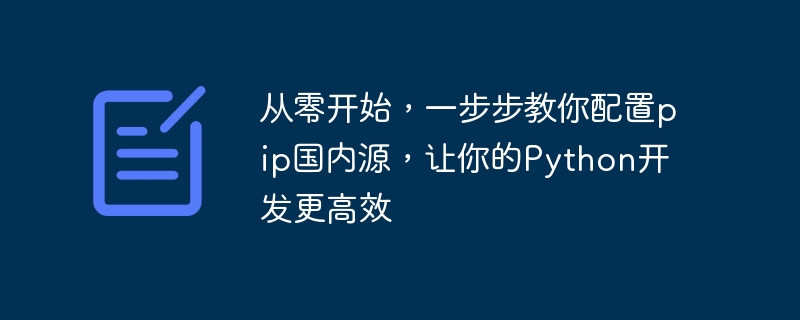Home >Backend Development >Python Tutorial >Improve Python development efficiency: teach you step by step how to configure domestic pip sources
Improve Python development efficiency: teach you step by step how to configure domestic pip sources
- WBOYWBOYWBOYWBOYWBOYWBOYWBOYWBOYWBOYWBOYWBOYWBOYWBOriginal
- 2024-01-17 10:10:111278browse

Start from scratch and teach you step by step to configure pip domestic sources to make your Python development more efficient
In the development process of Python, we often use pip to manage third-party libraries. However, due to domestic network environment problems, using the default pip source often results in slow download speeds or even inability to connect. In order to make our Python development more efficient, it is necessary to configure a domestic source.
So, now let us configure the pip domestic source step by step!
First, we need to find the pip configuration file. Execute the following command on the command line to open the pip configuration directory.
pip config edit
After executing this command, you will see a text editor opening a file named pip.ini. If you are using pip for the first time, you may see a prompt asking you to choose an editor. You can choose an editor you are familiar with to edit.
If you see a blank file, don't worry, we can write the configuration directly into it. If there is already content in the file, don't worry, we can add new configurations under the original content.
Next, we need to choose a suitable domestic source. Currently, the more commonly used domestic sources include Alibaba Cloud, Douban, Tsinghua University, etc. Here we take Alibaba Cloud as an example. If you want to use other sources, you can make the corresponding changes below.
In the editor, copy the following code to pip.ini:
[global] index-url = https://mirrors.aliyun.com/pypi/simple/ trusted-host = mirrors.aliyun.com
The index-url here specifies pip The download address of the package, trusted-host tells pip that this address is trusted. You can choose other sources according to your needs, but it should be noted that different sources may have different speeds and stability. It is recommended to choose based on the actual situation.
After configuration, save the file and exit the editor.
Next, we can test whether the configuration takes effect. Execute the following command on the command line to view the configured source:
pip config list
You will see output similar to the following:
global.index-url='https://mirrors.aliyun.com/pypi/simple/' global.trusted-host=mirrors.aliyun.com
If the displayed results are consistent with what we just configured, Prove that our configuration has taken effect.
From now on, when using pip to install third-party libraries, we will use the domestic sources we configured, so the download speed will be greatly improved.
Of course, sometimes we need to use some foreign sources. If you need to use foreign sources in a specific project, you can create a .pip folder in the project directory and create a pip.conf or pip.ini there file, and then write the corresponding foreign source configuration into it. This enables the use of foreign sources in this project.
When using pip to install a third-party library, you can also use the -i option to specify the source, for example:
pip install -i https://pypi.python.org/simple/ requests
This way you can temporarily specify a source to install a specific library .
In general, configuring pip domestic sources can greatly improve the efficiency of Python development, making it easier and faster for us to install third-party libraries. I hope this article can help you better configure pip domestic sources and add convenience and efficiency to your Python development.
The above is the detailed content of Improve Python development efficiency: teach you step by step how to configure domestic pip sources. For more information, please follow other related articles on the PHP Chinese website!
Related articles
See more- Teach you how to build a simple website: Python development web server
- How to develop interface in python
- Is it feasible to develop Android apps in Python?
- What is the basis for computers to have efficient computing capabilities?
- (Animation demonstration) How to write code efficiently in VSCode? Tips sharing

